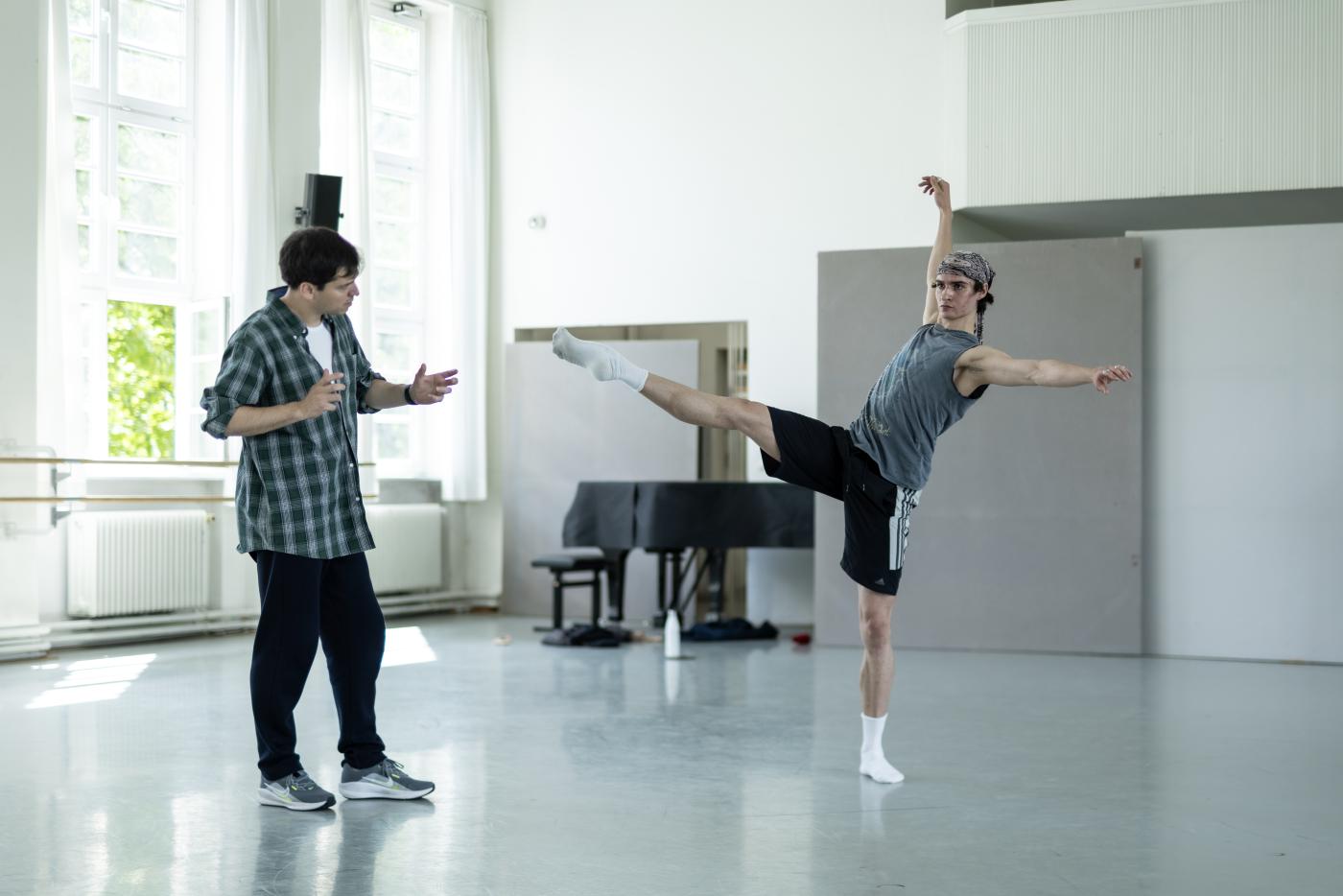The Hamburg Ballet
Hamburg State Opera
Hamburg, Germany
June 2025
by Ilona Landgraf
Copyright © 2025 by Ilona Landgraf
 After John Neumeier handed over the artistic reins of the Hamburg Ballet to Demis Volpi, a smooth transition process seemed underway. Volpi, whose career as a dancer and choreographer began in Stuttgart, was artistic director of the Ballett am Rhein when Neumeier’s successor came into question. A selection committee of eleven (including Ted Brandsen, Dutch National Ballet; Tamas Detrich, Stuttgart Ballet; Brigitte Lefèvre, Paris Opera Ballet; and Ashley Wheater, Joeffrey Ballet) recommended Volpi to the Hamburg State Opera board of directors. As it happens, he was Neumeier’s desired candidate. In 2022, the then thirty-seven-year-old Volpi was unanimously elected as Hamburg Ballet’s new artistic director as of August 2024.
After John Neumeier handed over the artistic reins of the Hamburg Ballet to Demis Volpi, a smooth transition process seemed underway. Volpi, whose career as a dancer and choreographer began in Stuttgart, was artistic director of the Ballett am Rhein when Neumeier’s successor came into question. A selection committee of eleven (including Ted Brandsen, Dutch National Ballet; Tamas Detrich, Stuttgart Ballet; Brigitte Lefèvre, Paris Opera Ballet; and Ashley Wheater, Joeffrey Ballet) recommended Volpi to the Hamburg State Opera board of directors. As it happens, he was Neumeier’s desired candidate. In 2022, the then thirty-seven-year-old Volpi was unanimously elected as Hamburg Ballet’s new artistic director as of August 2024.
Unlike Neumeier when he started out in Hamburg in 1973, Volpi was reluctant to restructure the company but set his hand to the repertory, which until then consisted of a Neumeier-only diet (foreign choreographies were the exception). Volpi introduced his own works and those of other contemporary choreographers, including Hans van Manen, Pina Bausch, Aszure Barton, and Justin Peck, alongside a Neumeier-heavy oeuvre. Though devoted to Neumeier, Hamburg Ballet’s audience received it like a breath of fresh air.
Everything seemed fine until five of eleven first soloists (Alexandr Trusch, Christopher Evans, Madoka Sugai, Alessandro Frola, and Jacopo Bellussi) quit in the spring and more than half of the ensemble penned a letter of complaint, which reached the press quicker than its addressee, Hamburg’s senator of cultural affairs, Carsten Brosda. The official number of signatures to this letter varies; the Rheinische Post mentions thirty-six dancers; the Neue Ruhr/Rhein Zeitung, thirty-five. But all media outlets consistently report that the dancers complained about a “toxic work atmosphere” and a “lack of appreciation,” accused Volpi of often being absent from rehearsals, and feared for Neumeier’s legacy. Once he quit, Alexandr Trusch was the most outspoken critic, denouncing the lack of quality and calling Volpi an impostor. An article in Die Zeit, by contrast, pointed out that many of Hamburg’s dancers wouldn’t be accustomed with styles other than Neumeier’s, failed to meet the new demands, and needed to be recast.
In any case, Hamburg Ballet arranged an external mediation to restore the peace, and the association, Friends of the Ballettzentrum, supported Volpi, trying to cool the overheated press. At that point, even outlets with no serious history of dance coverage had reported about the issue. They milked the fact that a young dancer burst into tears during a rehearsal of Romeo and Juliet, often without mentioning that she is a student of Hamburg Ballet’s school, was nurtured by Neumeier, and had recently learned that she wouldn’t be brought into the main company.
Then, another letter added fuel to the fire. Seventeen dancers from Volpi’s former workplace in Düsseldorf made anonymous accusations against him in support of their Hamburg colleagues. They claimed that the work environment under Volpi was characterized by “inconsequential communication,” “lack of transparency,” and an “atmosphere of fear and insecurity” and that Volpi discouraged and traumatized many. The letter omits details or proof. It took the executive director of the Oper am Rhein, Alexandra Stampler-Brown, by surprise—she said she knew nothing about such grave accusations against Volpi during his tenure but later admitted to having received two emails from one company member dealing with personal controversies. Miriam Koch, Düsseldorf’s cultural deputy, called the accusations against Volpi “orchestrated”.
Others also backed Volpi.
Jiří Kylián was refreshingly outspoken with Joachim Mischke, chief cultural reporter of the Hamburger Abendblatt. They discussed Neumeier’s fifty-one-year reign at Hamburg Ballet, during which everybody and everything were always aligned with him. Suddenly, Neumeier was replaced by someone new, who was expected to square the circle, that is, simultaneously preserve his legacy, shift to a new focus, and make a mark as a choreographer. Total self-centeredness is an unhealthy approach, Kylián pointed out. He couldn’t offer a magic bullet but suggested a friendly dictator approach should a company revolt (adding that this could go awry for an idiot dictator).
Hans van Manen called the upheaval “nonsense,” adding that Volpi had been in Hamburg for only eight or nine months and the dancers hadn’t given him a chance. When Neumeier resigned, he should have left for real.
Neumeier has declined to make statements, but through his foundation, he let it be known that he was very concerned about the future of the company. Die Zeit, in a recent article, alleged that Neumeier is insulted by not playing the first fiddle anymore. He still heads the National Youth Ballet, but, due to a shortage of rehearsal space, was dislodged from his former home, the Ballettzentrum. Reportedly, this caused him to vent his anger on stage before a performance. Die Zeit calls the entire quarrel “nasty scheming” and an “attempted coup d’état,” Kylián was less optimistic, but according to van Manen, Volpi won’t give up. He will fight, and he knows for what.
According to a yet unconfirmed report in today’s Hamburger Abendblatt, Volpi’s contract with the Hamburg Ballet will be terminated before the end of the season.
Update: According to a press statement by the Hamburg Ballet, Volpi and the Hamburg State Opera mutually agreed to terminate the contract. Volpi was exempted from his duties as of today. An interim director is yet to be determined.



